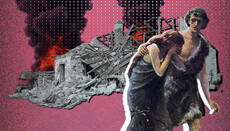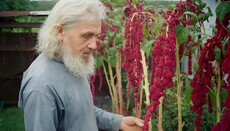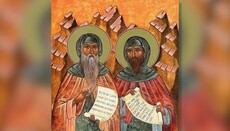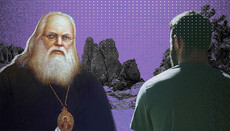But me, O Lord, You must prepare
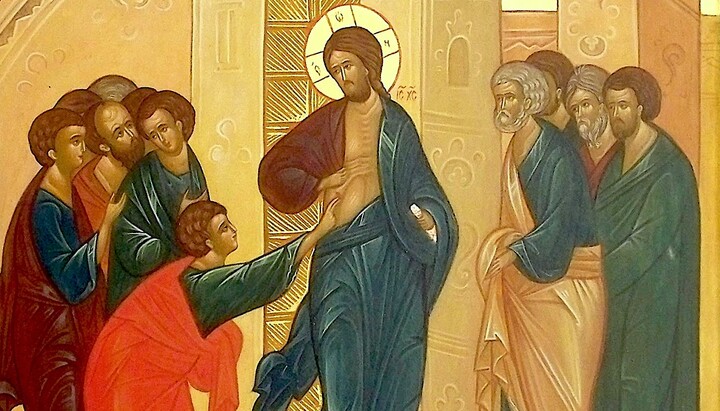
The Sunday of the Apostle Thomas
In every character of the Gospel narrative, we recognize ourselves. The experience of the Apostle Thomas is familiar to each of us. We know what it is like to feel sudden, unexpected surges of courage – moments that arise after hearing something inspiring or being stirred by zeal for God. Usually, such feelings do not last long, but sometimes they flare up in the heart as bursts of determination.
This was also the case with Thomas. When Christ announced the journey to Jerusalem – where danger and death awaited – most of the apostles hesitated. But Thomas, seized by a moment of heroic inspiration, said decisively, “Let us also go, that we may die with Him.” It is easy to feel heroic when danger is distant. Yet when death looks you in the eye, or even when life’s heavy trials come close, that courage often fades.
This pattern is not limited to ancient times. I have seen it in real life. Three years ago, a monk dared to voice a Christian judgment about the conflict between two warring nations. He believed he was ready to suffer for Christ. But when he faced a potential five-year prison sentence, he repented publicly, admitted fault, and thus had his sentence reduced to three years. I have known many people who once spoke boldly against injustice, without fear or caution, until lawsuits and real threats forced them to reconsider their words.
This is human nature: we are brave, but often only as long as we are safe.
Hieromartyr Anatoly Zhurakovsky, who spent ten years in Stalin's camps, dreamed of living quietly after his release – praying, working, and remaining unnoticed. But God granted him the martyr’s crown: he was executed shortly before completing his sentence. We also know the life of Saint Luke of Crimea, usually presented as flawless in courage, but he too was a man like us. After returning from exile, severely disabled, he refused episcopal ministry for fifteen years, though he never renounced his faith. Only in 1942 did he return to active service. There are many such examples.
Thomas declared, “Let us go, that we may die with Him.” Peter swore, “Though all others betray You, I will not.” But we know how these declarations ended.
Without the help of God, even the strongest can fall. True heroism is not our own achievement; it is a gift from God.
Therefore, we must accept a simple truth: we should not recklessly seek out acts of heroism that we are unlikely to bear – if only to avoid retreating later in shame and repenting for our presumption. To suffer for Christ is a gift from God; it comes not by our will nor by our desire. To take it upon ourselves without a divine calling is a sign of pride and self-reliance.
After the Savior’s arrest, Thomas, together with the other apostles, fled to his home. Like the others, he felt a deep sense of betrayal. All that he had placed his hopes upon seemed to collapse in an instant, scarcely having begun. Yet upon returning to his family home, Thomas found no solace there as he once had. There is a spiritual law: if a soul has dwelt, even for a brief moment, in the presence of Christ, nothing in this world can ever again suffice to fill the heart. The seal of that divine presence is indelible. The absence of Christ can be remedied by no one and nothing but Christ Himself. So it is with the one who sets forth on the path to God, only to turn back after a time – he will find nothing but the shattered ruins of a happiness he can no longer reclaim. History offers the somber examples of monks and even archimandrites who, abandoning their monastic vows in pursuit of earthly life and family, nevertheless found no true joy either in marriage or in the world.
The meeting with the Risen Christ changed Thomas forever. He no longer merely believed – he knew. Experiential knowledge of God grants the soul a strength that no philosophical conviction can offer. Thomas traveled across much of the known world, reaching as far as India, where he sealed his witness with martyrdom.
Professor Sergey Averintsev captured Thomas’ transformation beautifully in a medieval-style poem. Here are a few lines:
On the Assurance of Thomas
Reveal to me the depths of Your wounds,
show me Your pierced hands,
the gaping wounds of Your palms,
the portals of love and of pain.
I will believe unto the shedding of blood,
but strengthen my frailty, Lord;
blessed are they who believe without seeing,
yet me, O Lord, You must prepare.
Let me touch Your heart,
let me feel Your mystery,
lay bare the anguish of Your heart,
the secret heart within Your heart.
You were dead – and behold, alive forever,
in Your hand are the keys of death and hell;
blessed are they who believe without seeing,
but I would trade my place with none.
What I have seen, I have truly seen,
what I have touched, I surely know:
the spear passes through to the heart,
and opens it forevermore.
What these eyes have seen, they have seen,
what these hands have touched, they know:
the spear passes through to my heart,
and opens it unto eternity.
Blood for Blood, and flesh for Flesh,
and we shall drink of the Cup;
blessed are the witnesses of truth,
but me, O Lord, You must still prepare.
In a foreign land of India,
a land unknown to my fathers,
in a foreign land of India,
far from the home of my birth,
in a foreign land of India,
the spear shall pierce through my body,
the spear shall cleave through my flesh,
the spear shall tear through my heart.
You have called us Your friends,
and we shall drink of the Cup;
and my path shall be toward the rising sun,
to that foreign land of India.
And all that I will recall
in the frailty of my final agony:
the gaping wounds of Your palms,
and the deathless – pierced – heart.
But what about us? What are we to do – we whom Christ called "blessed" because we have "not seen, yet have believed"? What is the quality of our faith? We can discern it by the state of our spirit when we are faced with sorrowful trials. And for most of us, it will likely become clear that our faith is weak, and that it is very difficult to preserve a spirit of peace in such moments of testing. What we need is the living Christ and His living presence in our lives. That is why the repeated words of S. Averintsev’s poem strike so deeply into the heart: "But me – You must first prepare."
Prepare us, O Lord, for our departure from this life! Prepare us for the Golgotha that each of us must endure. Prepare us for Your eternity! For left to ourselves, we are capable of nothing.
